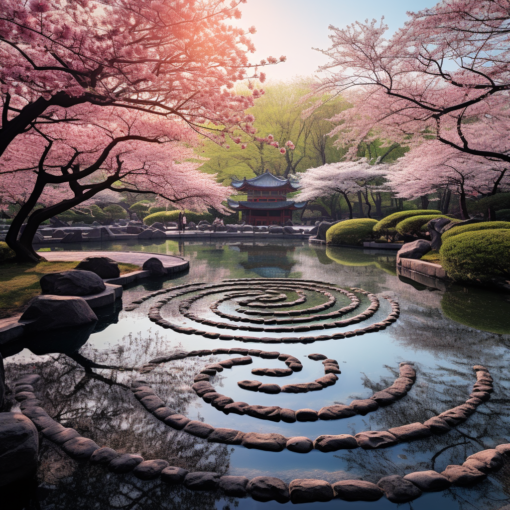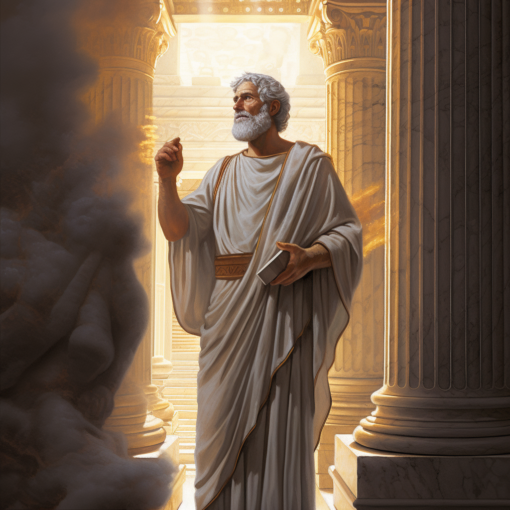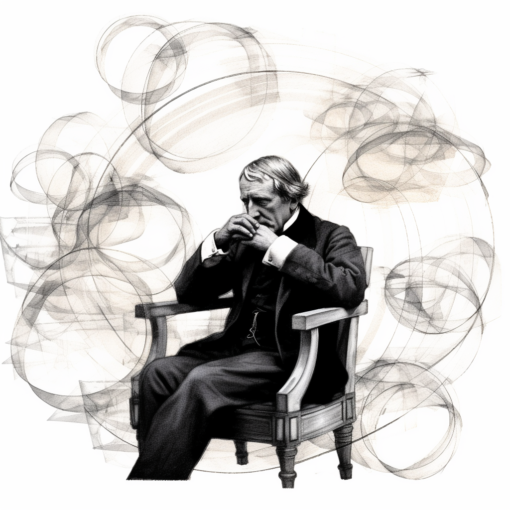Greetings, dear readers! It’s your favourite intellectual explorer, Percival Q. Higginbottom, here again to guide you through another labyrinth of thought and discovery. Today, we delve into the captivating realm of philosophy and thought, where we tackle the riveting riddles of existentialism.
Existentialism, my dear friends, is not merely a philosophical doctrine; it is a way of viewing life and our place within it. It’s a perspective that puts us, the individuals, at the very heart of philosophical inquiry. It questions our existence, our essence, and the freedom and responsibility that accompany our choices. An existentialist would say, “I think, therefore I am,” and then immediately follow it with, “But why am I, and what am I to do about it?”
Let’s take a moment to consider some of the pillars of existential thought. One of the key figures in this realm was Danish philosopher Søren Kierkegaard. He proposed that each person must navigate the tensions between the aesthetic, the ethical, and the religious stages of life to achieve a sense of individual truth and authenticity.
Then, we cannot forget Friedrich Nietzsche, the German philosopher who famously declared, “God is dead.” He argued that with the decline of religious belief, we humans are left to create our own values and find our own purpose. It’s not as grim as it sounds, though; Nietzsche’s proclamation was less a doom-laden prophecy and more an encouragement to personal empowerment and self-determination.
And of course, there’s Jean-Paul Sartre, who said, “Existence precedes essence.” In other words, we exist first, and it’s through our actions, decisions, and experiences that we define who we are. This, of course, brings us to the existentialist themes of freedom, responsibility, and the ever-looming spectre of ‘bad faith’ – the act of self-deception where we deny our freedom and responsibility to avoid confronting the anxieties of choice.
To navigate existentialism is to embark on a journey of self-discovery. It encourages us to face the universe’s seeming indifference, to embrace the freedom of our will, and to carve out our own path in the world. The questions it poses may not have definitive answers, but perhaps, dear readers, it’s in the search for these answers that we truly find ourselves.
So, I encourage you, dear readers, to ponder these existential riddles. Turn them over in your minds, grapple with them, challenge them, and let them challenge you. After all, philosophy isn’t a spectator sport; it’s a participatory journey. And who knows, you might just stumble upon some profound truths about your own existence along the way.
Until next time, remember to keep your minds open and your thoughts profound. This is your favourite philosophical guide, Percival Q. Higginbottom, signing off.

Further Reading:
- Stanford Encyclopedia of Philosophy – Existentialism: An in-depth look into existentialism, its origins, and its key figures.
- Internet Encyclopedia of Philosophy – Søren Kierkegaard: A comprehensive overview of Kierkegaard’s life and philosophical contributions.
- BBC – Friedrich Nietzsche: A succinct summary of Nietzsche’s life and ideas.
- The New Yorker – Jean-Paul Sartre’s Radical Philosophy: An article exploring Sartre’s philosophy and its relevance today.





9 thoughts on “The Riveting Riddles of Existentialism: A Journey Into Self-Discovery”
Your point of view caught my eye and was very interesting. Thanks. I have a question for you.
Can you be more specific about the content of your article? After reading it, I still have some doubts. Hope you can help me.
Can you be more specific about the content of your article? After reading it, I still have some doubts. Hope you can help me.
I don’t think the title of your article matches the content lol. Just kidding, mainly because I had some doubts after reading the article.
Thank you for your sharing. I am worried that I lack creative ideas. It is your article that makes me full of hope. Thank you. But, I have a question, can you help me?
Thank you for your sharing. I am worried that I lack creative ideas. It is your article that makes me full of hope. Thank you. But, I have a question, can you help me?
Thanks for sharing. I read many of your blog posts, cool, your blog is very good. registro de Binance
Can you be more specific about the content of your article? After reading it, I still have some doubts. Hope you can help me.
Chúng tôi tin rằng, với sự đầu tư bài bản và tâm huyết, xn88 link sẽ mang lại một không gian cá cược đẳng cấp, nơi niềm tin được đặt đúng chỗ. TONY01-23